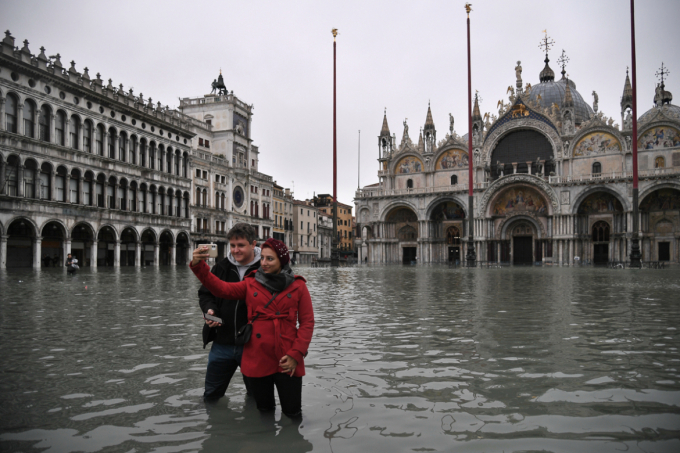November 26, 2025 | 17:39 GMT +7
November 26, 2025 | 17:39 GMT +7
Hotline: 0913.378.918
November 26, 2025 | 17:39 GMT +7
Hotline: 0913.378.918

Powerful rainstorms hit Italy in 2019, with the worst affected areas in the south and Venice, where there was widespread flooding. Photto: Marco Bertorello/AFP
An unpublished draft report, seen exclusively by AFP, reveals rising sea levels could affect hundreds of millions of people living in urban areas by 2050. As the earth warms and the ice melts, the seas will redraw the map of the world forcing many from their homes. Eventually, scientists predict, entire cities will have to be abandoned due to flooding.
Many of the world’s major cities are among those under threat including Mumbai, Jakarta, New York, Tokyo, Lagos, Shanghai, Miami and Dhaka. Those least able to protect themselves will be hit the hardest.
Even if global warming is kept under the 2 degrees Celsius agreed in 2015 in Paris, UN climate scientists predict sea levels could be up to 60cm higher by the end of the century. This coupled with increasingly extreme weather means land currently home to 300 million people will be vulnerable to annual flooding by 2050.
Cities like Venice and Jakarta are already sinking, while low-lying island nations in the Pacific are at risk of disappearing under the waves.
The Intergovernmental Panel on Climate Change (IPCC) report says "difficult choices will need to be made as sea level continues to rise, floods and storm surges become more frequent and intense, warming increases ocean acidity and intensifies heatwaves."
Without adaptation to sea-level rise, a worst-case scenario projection calculated damages between 1.6 and 3.2 trillion US dollars (€1.3 trillion to €2.7 trillion) by 2050 for the world’s 136 largest coastal cities. Up to 140 world heritage sites are also at risk of flooding, mostly in the Mediterranean.
The report says slashing emissions now can reduce the risks but "sea-level rise is accelerating and will continue for millennia," it says. The greenhouse gases already in the air have essentially baked-in the how much our waters will rise by before 2050.
AFP

(VAN) The Disaster Prevention Community Fund has mobilized resources to install automatic rain gauge and flood warning stations, helping localities proactively respond to natural disasters more effectively.

(VAN) Thanh Hoa province has substantial potential to supply carbon credits, opening opportunities for green economic development, enhancing agriculture and forestry value.
/2025/11/25/1741-0-nongnghiep-221736.jpg)
(VAN) The application of AI helps identify emission sources and assess air pollution developments, thereby supporting management agencies in issuing timely and appropriate control policies.

(VAN) Viet Nam will develop its carbon market not only by prioritizing transaction volumes but also by transitioning to a low-emission economy.
/2025/11/25/3413-1-171953_261.jpg)
(VAN) Experts from the Vietnam Academy of Science and Technology have conducted surveys to identify the causes of landslides in Lam Dong province and propose natural disaster prevention solutions.

(VAN) The HNT reservoir operation support system, developed by WeatherPlus in collaboration with Kyushu Electric Power, enables real-time rainfall forecasting, inflow forecasting, and flood-release simulations.

(VAN) Dr. Cao Duc Phat stated that the localization of early natural disaster warning technologies will help meet practical requirements and create favorable conditions for domestic research institutions and businesses to develop.